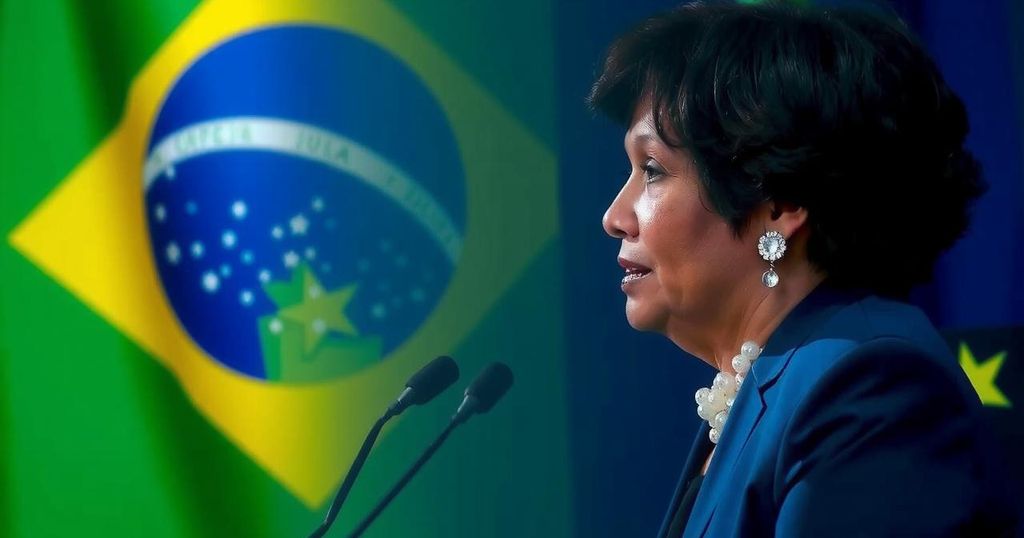Climate change
Politics
Technology
AGENCIA BRASIL, ALCKMIN, ARGENTINA, ASIA, AZERBAIJAN, BAKU, BRAZIL, CLIMATE CHANGE, DEMOCRACY, EUROPEAN UNION, FACEBOOK, MARINA SILVA, MILEI, NORTH AMERICA, PARIS AGREEMENT, RIO DE JANEIRO, SILVA, SOUTH AMERICA, TRADE RELATIONS, UNITED STATES, WASHINGTON
Leila Ramsay
0 Comments
Brazil’s Minister Critiques Argentina’s Withdrawal from COP29
Brazil’s Climate Change Minister Marina Silva criticized Argentina’s withdrawal from COP29, calling the decision detrimental to global climate efforts. Despite concerns, she believes this will not hinder negotiations for financial support to developing countries. Vice-President Geraldo Alckmin also condemned the withdrawal and highlighted potential economic repercussions for Argentina, reinforcing the necessity of scientific collaboration in addressing climate change.
Marina Silva, Brazil’s Minister for Environment and Climate Change, expressed concern over Argentina’s decision to withdraw its delegation from the 29th Conference of the Parties (COP29) in Baku, Azerbaijan. She stated that this move contradicts global efforts to combat climate change. Nonetheless, Silva indicated that President Javier Milei’s withdrawal would not hinder ongoing negotiations aimed at securing financial support from developed nations for developing countries in relation to environmental agreements. During her comments, Silva emphasized the universal costs that countries face due to climate change, highlighting that noncompliance with environmental responsibilities exacerbates these challenges. She stressed that climate negotiations planned for the upcoming G20 Summit in Rio de Janeiro, occurring on November 18 and 19, would remain on track despite Argentina’s stance. Silva remarked, “The G20 has already made the progress we had hoped for… we were able to bring together the climate agenda and the finance agenda at a historic meeting in Washington.” Vice-President Geraldo Alckmin shared Silva’s concerns, criticizing Milei’s denial of climate change. He referenced the vital role of science in improving public health, stating that scientific advancements have significantly increased global life expectancy. He warned that Argentina’s decision could have economic ramifications, potentially decreasing its GDP. However, he assured that this would not impact the broader state relations between Brazil and Argentina.
The statement from Brazil’s Environment and Climate Change Minister reflects the ongoing global debate over climate change and the responsibilities of nations to adhere to international agreements such as the Paris Agreement. The Conference of the Parties (COP) serves as a crucial platform for countries to negotiate climate policies, and decisions by member nations can significantly impact global efforts to combat climate change. The recent withdrawal by Argentina under the leadership of President Javier Milei raises concerns about the future of international climate collaboration and financial support for developing nations.
In conclusion, Marina Silva’s remarks underscore the importance of global cooperation in addressing climate change, positioning Argentina’s withdrawal as contrary to international objectives. Despite this setback, Brazilian officials remain optimistic about the upcoming G20 Summit’s potential for progress in climate negotiations. The implications of Milei’s decision could extend beyond the environmental realm, potentially affecting Argentina’s economy and its relations with neighboring countries.
Original Source: en.mercopress.com




Post Comment